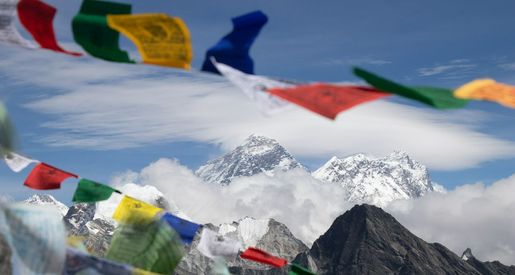- Details
- Category: Knowledge Centre
Trekking to Everest Base Camp with Asthma
When I was younger, which seems like a very long time ago now, I used to struggle massively with Asthma.
It wasn't an easy thing to deal with and it would catch me out at random moments.
When I was out and about watching my dad play football on a Saturday afternoon.
When I was in school doing exercise in PE class!
However, one of my most memorable moments was when one evening, my dad sat me down to watch American Werewolf in London. I think I was about 6 or 7 at the time. We laugh about this now and my dad’s a super amazing bloke but it probably wasn’t the best idea to watch that film at that age as the moment where the main character changes into a werewolf…well, it was enough for me to pay a visit to the local hospital as it brought on an Asthma attack.
It does show it’s hand from time to time and I need to get my good old friend out, the blue inhaler but I have learned to manage my body and my asthma so it doesn’t affect my life on a daily basis.
I know that this isn't the case for everyone who has asthma as there can be varying levels of the condition.
The reason I mention all of this is that we do get a fair number of emails quite regularly from people who have asthma and who are genuinely concerned about heading to Everest Base Camp or high altitude with this condition.
If you're thinking of heading to Everest Base Camp it’s important to get some facts.
So the good news…always first.
There is no direct evidence that having mild asthma will put you at a higher risk of altitude sickness.
Which is awesome for us high altitude asthmatics!
On the other hand, even though allergens and irritants are usually reduced while at altitude, due to the dry air and increased physical exertion, this together can bring on some forms of asthma and the risk factor, therefore, does increase.
I have had to use my blue inhaler a couple of times over the years on the way to Everest. Not many times, but enough to be mindful that I always take it with me at high altitude.
So if you have asthma and you're thinking of trekking to EBC what can you do?
Well, first and foremost, just be smart with how you manage yourself especially if you have any medications!
We do advise you to visit your doctor before you go and make sure you are carrying everything that you need! IE. Things like your inhaler, any steroids you might use or anti-biotics that kind of thing.
This all might seem like common sense like most things are on the treks at high altitude but it's always worth a reminder.
Next up is to make sure you cover up your airways.
When you breathe at high altitude, it’s the dry air that you want to avoid so I highly recommend you wear a neck buff when trekking on certain parts of the trail to cover your nose and mouth. If you use your EverTrek buff that will do the job for sure.
Wearing this works really as the buff covering your airways heats up the air that you breathe in and helps reduce the irritation from the dust in the air as it does get dusty on certain parts of the trails as shown below.
Next up and one of our favourites...fitness.
You may have heard of exercise-induced asthma? This is not necessarily caused by exercise itself but more to do with the cooling and drying of air that occurs because of breathing more during exercise. This was something I’ve had to deal with over the years. However the fitter I have been the less this effects me.
At high altitude, your breathing rate is already increased and your body is working overtime so to minimise the effects it’s important to have your body in the best shape possible. You can read more about the training needed for the Everest Base Camp trek here.
This doesn’t mean you need to have a superhuman level of fitness as we get a huge mix of fitness levels complete the Everest base camp trek but if you have asthma then doing regular exercise and being fit does improve your time at high altitude.
If there is one thing I have learned from trekking at high altitude with asthma it’s that, more than anything else, it does come down to your mindset and how you approach the trek. Try and see things from a positive angle. For instance, when you breathe at high altitude it’s the same as breathing at sea level, you just have to breathe more often and therefore you naturally slow down. In doing this, trekking at a super slow pace is awesome for acclimatisation which has massive benefits as you ascend.
I’ve seen people trekking with asthma who have functioned better above 5000m than others who don’t have it. Why? Because the extra hour each day they took getting to their daily destination as they were slower builds up. After 8 days, it’s over 8 hours of additional acclimatisation compared to the speedster at the front. Going super slow prevents you from 'huffing and puffing' your way along the entire trek.
So if you suffer from asthma, and have been feeling a little anxious about heading on the trek to Everest Base Camp then try not to worry too much. Just stay positive, be smart, be prepared and you will have an amazing life-changing trip.
It certainly changed my life that's for sure.
If you need more information around anything trekking related, especially on the fitness required for an Everest Base Camp trek, then check out "How to train for EBC"!
Previous Articles
- How to Train for the Everest Base Camp Trek
- How high is Everest Base Camp?
- How much spending money do you need for the Everest Base Camp trek
- What's the accommodation like on an Everest Base Camp trek
- Are showers available on the Everest Base Camp trek?
- What type of toilets are available on an Everest Base Camp Trek






